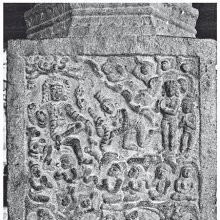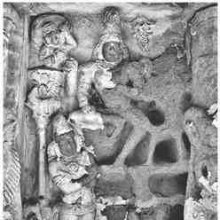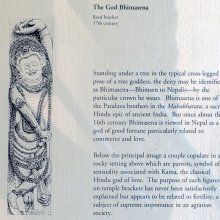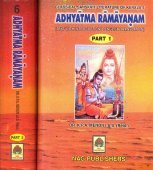Kama, Kāmā, Kāma, Kamā: 49 definitions
Introduction:
Kama means something in Buddhism, Pali, Hinduism, Sanskrit, the history of ancient India, Marathi, Jainism, Prakrit, Hindi, biology, Tamil. If you want to know the exact meaning, history, etymology or English translation of this term then check out the descriptions on this page. Add your comment or reference to a book if you want to contribute to this summary article.
Kama has 47 English definitions available.
Alternative spellings of this word include Kaam.
Images (photo gallery)
Languages of India and abroad
Sanskrit dictionary
[Deutsch Wörterbuch]
Source: Cologne Digital Sanskrit Dictionaries: Böhtlingk and Roth Grosses Petersburger WörterbuchKamā (कमा):—(von kam) f. Lieblichkeit, Schönheit [Rājanirghaṇṭa im Śabdakalpadruma]
--- OR ---
Kāma (काम):—
--- OR ---
Kāma (काम):—2. (wie eben) adj. begehrend, wünschend: kā.asya.yatrā.tāḥ kāmāḥ [Ṛgveda 9, 113, 11.] Die Oxytonirung von kā.ān [Vājasaneyisaṃhitā 20, 60] muss irrthümlich sein, indem dasselbe zu 1. kāma a, gehört. Nach Vārtt. [?6 zu Pāṇini’s acht Bücher 3, 2, 1] soll kāma am Ende von compp., welche wir für adjectivische halten, adj. sein: sāṃsakāma nach Fleisch begehrend und nicht dessen Begehren nach Fleisch geht.
--- OR ---
Kāma (काम):—1.
1) a) śrotratvakcakṣurjihvāghrāṇānāmātmasaṃyuktena manasādhiṣṭhitānāṃ sveṣu sveṣu viṣayeṣvānukūlyataḥ pravṛttiḥ kāmaḥ Lust, Vergnügen [Oxforder Handschriften 216,a,28. fg.] udyatasya hi kāmasya prativādo na śasyate [Spr. 3788. 3803. Z. 12] ist die Stelle [The Śatapathabrāhmaṇa 14, 9, 4, 7] zu streichen, da kāmam dort adv. ist. — b) Agni Kāma [Taittirīyasaṃhitā 5, 1, 8, 2.] [Kāṭhaka-Recension 19, 8.] [Śāṅkhāyana’s Brāhmaṇa 19, 2.] Kāma als Nomen proprium [KṢITĪŚ. 5, 8] (vielleicht kāmadeva als ein Name zu fassen). [6, 13.]
Source: Cologne Digital Sanskrit Dictionaries: Sanskrit-Wörterbuch in kürzerer FassungKamā (कमा):—f. Lieblichkeit , Schönheit.
--- OR ---
Kāma (काम):—(einmal kāma [Vājasaneyisaṃhitā]) —
1) m. (adj. Comp. f. ā) — a) Wunsch , Begehren , Verlangen nach (Gen. , Dat. oder Loc.) , Trieb , Lust , Vergnügen. kāmāya nach Wunsch , Jmds (Gen. oder Dat.) Wunsche entsprechend , so v.a. Jmd zu Liebe. kāme dass. kāmāt aus eigener Lust , freiwillig , gern , absichtlich. Am Ende eines adj. Comp. mit vorangehendem Objecte (häufig eine Infin. auf tu) ein Verlangen haben — , begehrend nach , die Absicht habend zu. — b) ein Gegenstand des Wunsches , Begehrens , Verlangens , der Lust. — c) Liebe , insbes. Geschlechtsliebe. — d) Einsatz im Spiele [Nārada’s Dharmaśāstra 16,7.] — e) personif. — α) der Wunschgott. — β) der Liebesgott. — f) Beiname — α) Agni's. — β) *Viṣṇu’s [Galano's Wörterbuch] — γ) Baladeva's. — g) *eine Mangoart. — h) *eine Bohnenart [Galano's Wörterbuch] — i) eine best. Tempelform [Hemādri’s Caturvargacintāmaṇi 2,a.58,10.] — k) ein best. Metrum. — l) Nomen proprium verschiedener Männer. —
2) f. kāmā — a) nur Instr. kāmayā in Verbindung mit brūhi oder prabrūhi so v.a. frei heraus. — b) Nomen proprium einer Tochter des Pṛthuśravas. —
3) *n. — a) Gegenstand des Wunsches. — b) der männliche Same.
Sanskrit, also spelled संस्कृतम् (saṃskṛtam), is an ancient language of India commonly seen as the grandmother of the Indo-European language family (even English!). Closely allied with Prakrit and Pali, Sanskrit is more exhaustive in both grammar and terms and has the most extensive collection of literature in the world, greatly surpassing its sister-languages Greek and Latin.
See also (Relevant definitions)
Starts with (+1199): Kama Jataka, Kama kasturi, Kama Kusala, Kama Lavanem, Kama Sukh Allikanuyoga, Kama Sutta, Kama-bhoga-tivrabhilasha, Kama-garnu, Kama-kasturi, Kama-na-kaja, Kama-pattige-balli, Kama-samcnu, Kama-se-kama, Kamaakkala, Kamaamai, Kamaane, Kamaasala, Kamaasalai, Kamabaddha, Kamabaja.
Ends with (+449): Abhagnakama, Abhikama, Abhikkama, Acankama, Adakama, Adharmakama, Adhikama, Adrishtakama, Agantukama, Agnikama, Agrima-rakama, Aikama, Aikkama, Aikkama, Aka-mukama, Akama, Akhyatukama, Akkama, Akkama, Akshakama.
Full-text (+2982): Kamam, Kamaja, Kamakala, Kamapatni, Kamamgamin, Ananyaja, Kamaya, Yathakamam, Kamayus, Kamankusha, Kamakkaran, Kamarasa, Kamalata, Purushartha, Kamaduh, Kamasakha, Anangasuhrid, Kamaduti, Kamashara, Kamasakti.
Relevant text
Search found 262 books and stories containing Kama, Kāmā, Kāma, Kamā; (plurals include: Kamas, Kāmās, Kāmas, Kamās). You can also click to the full overview containing English textual excerpts. Below are direct links for the most relevant articles:
Chandogya Upanishad (Madhva commentary) (by Srisa Chandra Vasu)
Eight Adhyaya, Third Khanda (5 mantras)
Eight Adhyaya, First and Second Khandas (18 mantras)
Garga Samhita (English) (by Danavir Goswami)
Verse 1.9.17 < [Chapter 9 - Description of Vasudeva’s Wedding]
Verse 5.8.1 < [Chapter 8 - The Killing of Kaṃsa]
Verse 3.8.11 < [Chapter 8 - The Opulences of Śrī Girirāja]
Brahma Sutras (Shankaracharya) (by George Thibaut)
III, 2, 2 < [Third Adhyāya, Second Pāda]
III, 3, 39 < [Third Adhyāya, Third Pāda]
II, 4, 6 < [Second Adhyāya, Fourth Pāda]
Kamashastra Discourse (Life in Ancient India) (by Nidheesh Kannan B.)
7. Concept of Kāma (Introduction) < [Chapter 4 - Positioning Kāma among the Puruṣārthas]
9. Kāma among Puruṣārthas < [Chapter 4 - Positioning Kāma among the Puruṣārthas]
Shrimad Bhagavad-gita (by Narayana Gosvami)
Verse 2.70 < [Chapter 2 - Sāṅkhya-yoga (Yoga through distinguishing the Soul from the Body)]
Verse 9.21 < [Chapter 9 - Rāja-guhya-yoga (Yoga through the most Confidential Knowledge)]
Verse 2.46 < [Chapter 2 - Sāṅkhya-yoga (Yoga through distinguishing the Soul from the Body)]
Brihad Bhagavatamrita (commentary) (by Śrī Śrīmad Bhaktivedānta Nārāyana Gosvāmī Mahārāja)
Verse 2.4.53-54 < [Chapter 4 - Vaikuṇṭha (the spiritual world)]
Verse 2.4.87 < [Chapter 4 - Vaikuṇṭha (the spiritual world)]
Verse 2.4.93 < [Chapter 4 - Vaikuṇṭha (the spiritual world)]
Related products
(+1 more products available)










